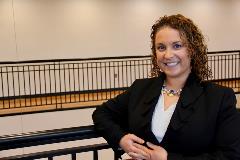Findings Staff Report | April 14, 2020
It’s like watching a slow-motion train wreck, over and over, says UC health communication professor and social scientist Shaunak Sastry. That’s the most aggravating part.
Sastry is in China. He arrived mid-January, just as the attention of the world snapped to Wuhan, China, where a novel coronavirus was spreading quickly.
Sastry had planned to begin a sabbatical fellowship at the Communication University of China in Beijing in March. Instead, he found himself quarantined for more than two months with his family—spouse, Zhuo Ban, also a member of the UC faculty, and their two children—at in-laws in Nanjing, China, where his spouse is originally from. Their movement was severely restricted. Grocery stores stayed open but everything else was on lockdown, with temperatures taken at store entrances and outside apartment gates.
“You can predict when the cases are going to hit based on the available models,” Sastry says, “But we watched it sweep through China, then through Italy and now the United States and India,” Sastry says, speaking via FaceTime, 9:30 p.m. his time, 9:30 a.m. Eastern. “To see the lack of action despite the evidence—that somehow it’s not going to happen to us—it’s been hard to watch.”
With his fellowship on hold, Sastry, like so many UC researchers, has turned his expert eye to COVID-19.
Sastry's research focuses on the role of cultural practices in epidemics. He has published ethnographic work on the HIV epidemic in India, the US-led global HIV/AIDS prevention response, and the 2014 West African Ebola epidemic and will not be sitting idle. He’s been invited to lead a research forum for a leading journal in his discipline on how public health practitioners and health professionals across the globe are using crisis communication strategies, developing novel dissemination approaches and engaging communication theories and principles in the fight against COVID. He as also started research on the cultural politics of mask-wearing as a public health strategy, based on ethnographic and qualitative research.
He is just one of many faculty members—60 and counting, to date—that the Office of Research is helping guide and support as the pandemic continues. Under unprecedented and rapidly changing conditions, UC researchers of all stripes have taken up the COVID-19 charge.
“Necessity is the mother of invention,” says Vice President for Research Pat Limbach, quoting the ancient proverb. “Top-tier research universities like ours are getting to work and we’re here to help our researchers do it.”
Researchers are tackling COVID-19 in a myriad of ways.
Dr. Carl Fichtenbaum, an infectious disease expert and professor of clinical medicine has been approved to do two clinical trials on local COVID-19 patients. Another medical researcher is working on a saliva test. Others are data mining for strategies to slow the spread or map it, while one team hopes to create a molecular diagnostic testing platform for smart phones.
Then there’s Brittany Punches, a UC assistant professor with a Ph.D. from UC College of Nursing. In 2008, she began working in the emergency department at UC Health. She saw how it operated and noticed patients often had barriers leading to preventable conditions.

Today, she helps lead UC's Early Intervention Program, which focuses on preventable health conditions, such as HIV/AIDS and substance abuse. The program works with high-risk patients in the emergency department. That’s tricky with COVID-19, and the team is working through its new challenges. “We still have patients that need our help,” Punches says. “We’re still trying to be there for them.”
She’s added another project, COVID-19-related.
Punches represents UC in a collaborative of researchers around the country called AURORA, spearheaded by the Institute for Trauma Recovery at the University of North Carolina. With the support of more than $30 million from the National Institutes of Health and private sponsors, the initiative looks to improve understanding, prevention and recovery for victims of trauma. The group has enrolled over 3,000 emergency department patients to study Post Traumatic Stress Disorder, but that was put on hold due to the coronavirus.
During the pause, the collaborative swiftly changed course and is looking at the contrasts of personal protective equipment use and procedures at 30 urban hospitals. Punches is interested in the overall morale of the staff in the emergency department.
“I think we’re learning a lot of lessons from this,” Punches says. “Pandemics don’t happen every day, but when you think of examples like Ebola, H1N1, and bird flu these illnesses do happen pretty frequently. This has been a wildfire, but it will help us prepare and have a better structure for next time.”
Across the world, in China, life is beginning to normalize, Sastry says. The lockdown in Nanjing has been lifted, but it’s nerve-wracking to watch the US brace for the worst. The slow-moving train wreck, again, Sastry says.
It brought some relief to see Ohio Gov. Mike DeWine and Ohio Department of Health Director Amy Acton take quick action, Sastry says.
“All the experts kept saying it is only a matter of time given the virus’ exponential growth,” Sastry says. “I was glad to see what was happening in Ohio. Usually, you don’t hear much about Ohio on Chinese social media—but you’d be surprised by how many DeWine and Acton references there are on Sina Weibo [the Chinese version of Twitter].”
With Acton’s STAY AT HOME Order issued April 2, only UC’s critical research are permissible on campus through May 1. If you’re a researcher with questions, visit our website Coronavirus and Your Research.